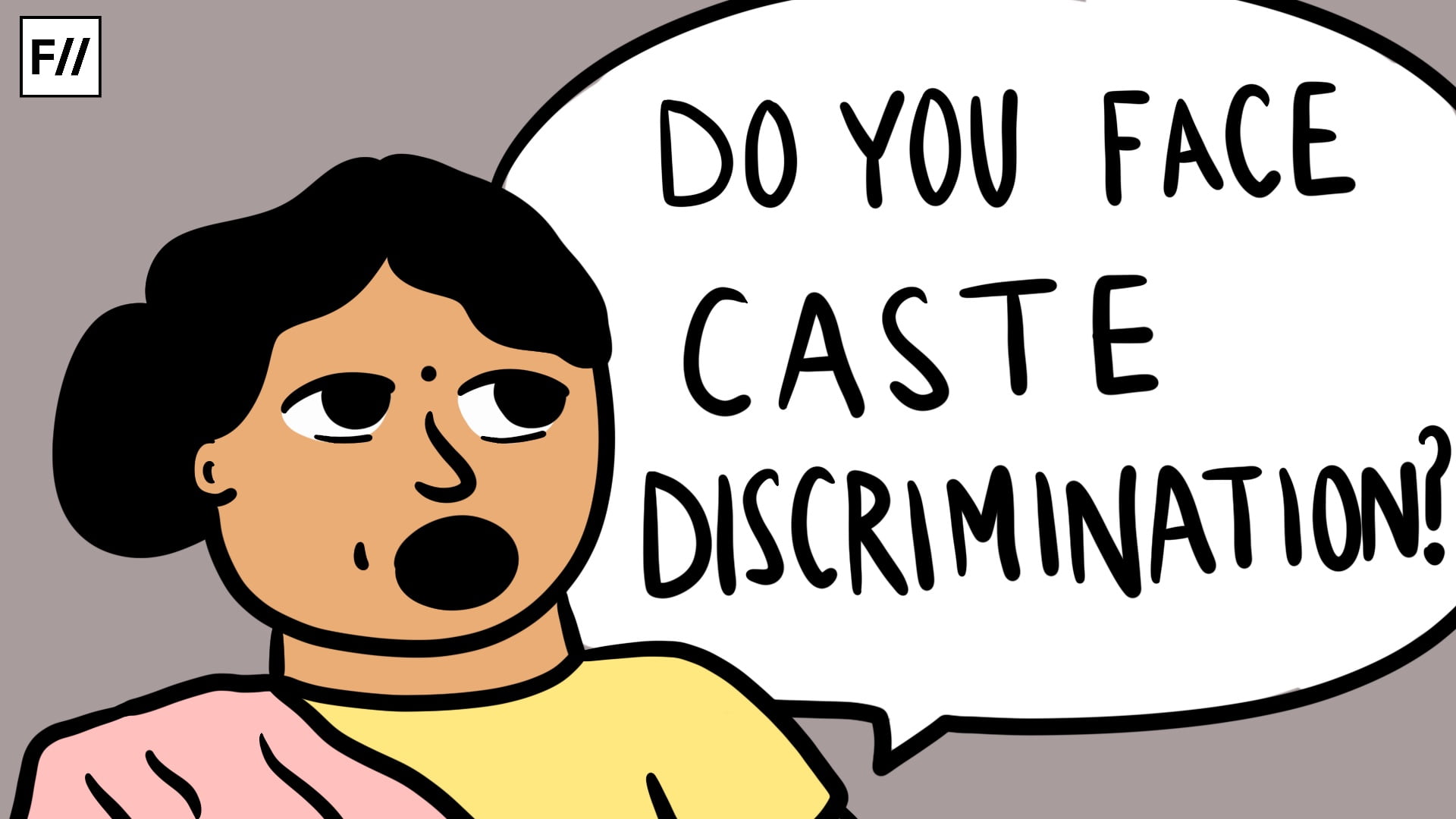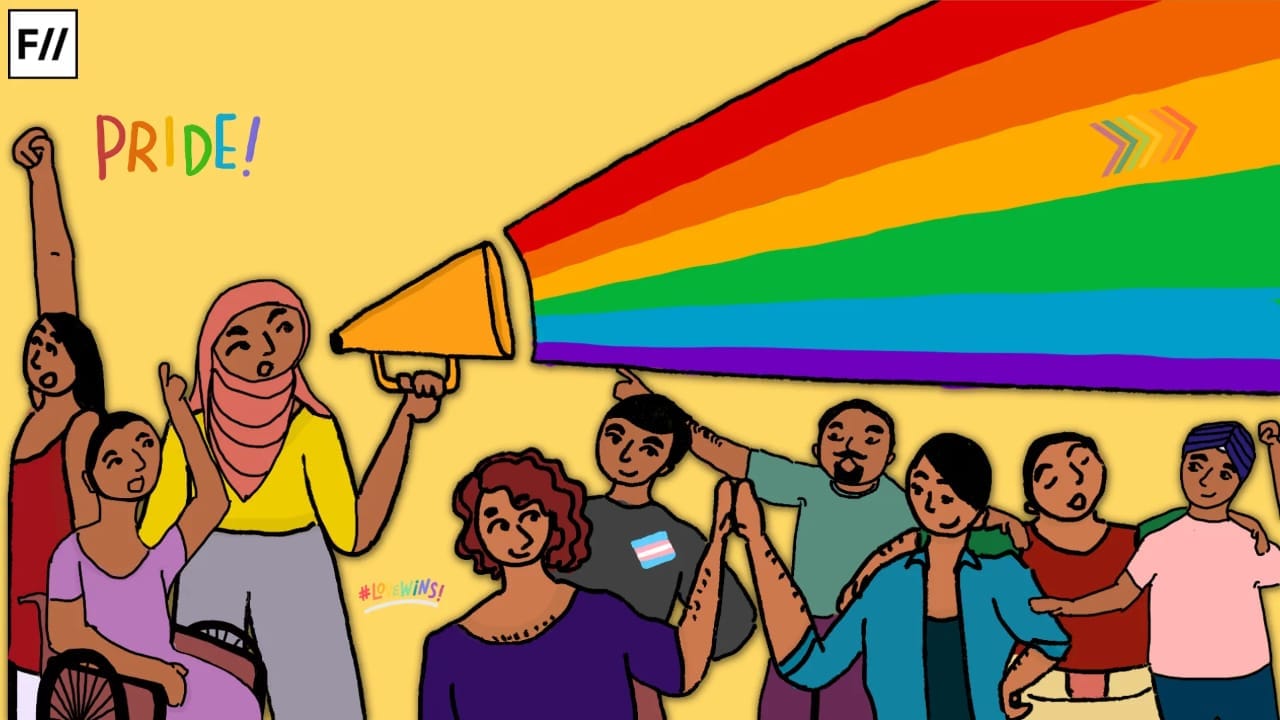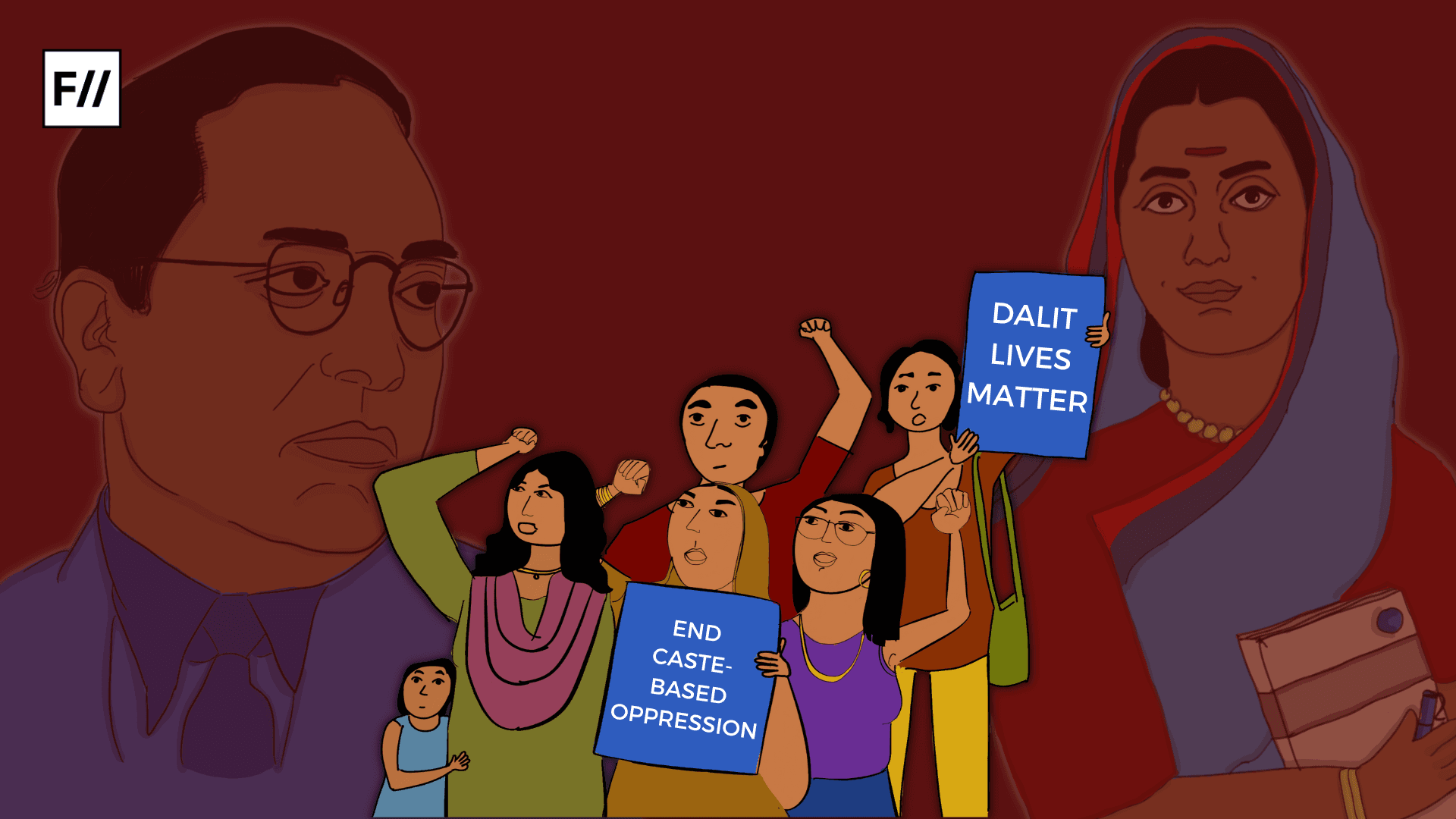Trigger warning: Rape, Violence, Abuse
Before starting to write my words, I want to give one disclaimer here. Whatever I am writing comes from my personal, lived experience. So if anyone is hurt because of that, I apologise. If you are unable to digest the facts and thoughts I hereby state, please feel free to build your critique against the Indian social structure that has made my experiences such. However, I do welcome all your suggestions and criticisms.
“Brahmin is born from Mouth
Kshatriya from the Arms
Vaishya from the chest and
Shudra from the feet”
-Rigveda
In the society where I happen to be born, Hindu epics like Dharmashastras and Smritis talk about the origin and structure of the varna system which has defined the social framework of our society since centuries ago. The Rigveda is the oldest one which tells us that all the four Varnas – Brahmin, Kshatriya, Vaishya and Shudra – have originated from the different limbs of the almighty. But, I fail to locate myself within this social structure as I, an Atishudra, am apparently out of this so-called Varna system. If the society is already divided like that by its very structure, where the caste hierarchies are followed by its very design, then asking questions like “Do you face caste discrimination?” is itself a sign of neglect on the part of those non-Dalits who have thrown it in my face directly and indirectly, multiple times. Shouldn’t I rather be asked, “How have you faced caste discrimination?”
Asking the former question is by itself wrong, considering that India has had a long history of caste-based discrimination; only a person who has never experienced caste can ask such a question. Those of us who’ve already faced caste discrimination would never ask this question because we know how it feels when someone asks us this. When a stranger or even a friend asks if I’ve faced discrimination, they are at the same time reminding us how we differ from them; they make us remember our state as the victims of the casteist structures they’ve built and maintained.
People who ask us this have probably never experienced caste discrimination themselves – which doesn’t fail to surprise me – or they might just be making a mockery out of it. Those of us, who have faced the same discrimination, don’t ask if it was experienced, but in what ways it was experienced by each of us. I am writing this on behalf of all the Dalit women who have experienced this pain and grief. I know my birth, or all humans’ births for that matter, is an accident; it’s not my fault. So if I was born to a particular community, how is it my fault? I am not going to talk about the history of Dalit people here, as some still consider that Dalits have never had a history of their own.
When a stranger or even a friend asks if I’ve faced discrimination, they are at the same time reminding us how we differ from them; they make us remember our state as the victims of the casteist structures they’ve built and maintained.
When anyone asks me if I have faced any caste discrimination, then I don’t understand how I react or reply to them. I don’t understand what I should tell them because the moment they ask me this question, I feel discriminated because they didn’t ask this question to everyone or anyone. When I was asked about the same thing earlier when everything looked good, when probably I was living in a pseudo-reality, I never felt vulnerable, maybe only a little guilty. But now that I am aware of the whole social construct of where one comes from, the question suddenly hits me in the face, making me feel vulnerable.
When we asked to tell them if we were discriminated against, don’t they already know our identity as the victims of the Indian caste-based society belonging to the community which is lowest in caste hierarchy? Don’t they already know it in their hearts that yes, of course, we have faced discrimination? Couldn’t they rather ask us how did it make us feel? They must sit back and think how the framing of their inquiry itself comes from a casteist mindset which has already differentiated people based on their castes. They don’t realise how the question itself comes out as a tool of domination, they don’t realise the grief that we have experienced. But maybe it’s not their fault, maybe they didn’t get exposed to the stark reality.
Also read: What Does Being An ‘Elite Dalit’ Woman Mean?
I belong to Bhandara district in Maharashtra. Some of you might have already heard this name from twelve years ago on 29 September 2006, as Kherlanji massacre happened at Bhandara where four members of one family belonging to scheduled caste were murdered in a small village called Kherlanji. The women of the family, Surekha and Priyanka, were paraded naked in public in the village, sexually abused and gang-raped before being murdered. I think I was in 5th class when the protests against the killing took place in various parts of Maharashtra. We all know this issue and we know how a politically, socially dominant caste group exploited Dalit people. For a very long time, no in-depth media coverage was given to this massacre. After a very long time, this issue came in mainstream media and everyone became conscious about this issue. To stop such issues from coming out in the public is another form of discrimination we have faced throughout our history.
Every other day when we find that small clipping about six Dalit women being raped in the newspaper, how many of them are followed up to see if the accused get punishment? They feel Dalit women’s body is like their own property and that’s why they sexually assault Dalit women. We Dalit women have faced triple oppression – firstly we are Dalit, secondly, we are poor and thirdly, we are women. On the basis of caste, class and gender, we are suffering from this triple burden. And they simply ask me “Have you faced caste discrimination?”
In my childhood days I did not realise that I’m being discriminated against, but today when I look back, I realize how in many ‘tiny’ incidents I was facing discrimination without having any realisation about it. Today when I know very well what is caste and I am aware of how the discrimination is ingrained in the social practices, I realise even my childhood wasn’t all that flowery. They ask me “Oh! You are a Dalit (you are S.C.) but you don’t look like one!” I can never figure out what is expected of us in terms of appearance as a Dalit.
We are being victimised when people ask us more than a hundred times with a surprised look on their face, why do we not look or eat like a Dalit. If we don’t eat meat they tell us “oh you are a kalank in the name of Dalit”. If we eat meat then they comment “Oh, the best people to learn eating meat from are Dalits”. I don’t understand what is it and why is it that they expect from us, why such narrow expectations in the first place? When I listen to similar narratives I feel ashamed for their thoughts, they have no idea of the hurt caused by the way they put their questions and remarks. They tell us we don’t have knowledge or intellect, that we are getting positions in any sphere only on the basis of reservation. I want to tell them, “Oh man, do you have a count of how many days you people kept us out of education?”. And yet, we haven’t stopped performing.
Our people today not only depend on reservations but they also come through merit and even pass as general candidates achieving higher ranks than you. That’s why your small-minded hatred makes you react like that. And your small thoughts don’t make me angry, but it makes me feel miserable because it is us who have had the experience of caste discrimination and your negligence of our sorrow and pain when you ask us that question, breaks our heart, again and again.
Then there are those who live in the delusion of knowing Ambedkar, flaunting their knowledge by calling him “baba”. Maybe they have read Ambedkar and several parts of his literature but they fail to understand the thoughts of Ambedkar. One of my brothers often says how some of us don’t understand Ambedkar because we fail to internalize his ideology. They say we are not casteist, but I ask them, why then you continue to dominate us on the basis of caste and why you always behave like you are superior?
I have met people who have been victims of the oppression to the extent that it has made them lose their friends.
I have met people who have been victims of oppression to the extent that it has made them lose their friends. Maybe those friends were already conscious about our caste identities at the beginning of the friendships, but somehow their subconscious mind did not permit them to continue their friendship with us. Even while being friends, they very frankly point out the stereotypes they hold about us while feeding their own curiosities about us without realising how they discriminating they are being even while spending time with us. They might flaunt their support for “humanity”, claiming they are not casteists, but I beg to point it out to them, how they are only lying to their own selves.
So to the people who ask us such question, I request them to come out of the illusion of being anti-casteist or projecting India as a caste-less society. You don’t get to call yourself an Ambedkarite when you didn’t contribute anything to eradicate caste. You probably never truly understood Babasaheb.
During my fieldwork, I have seen the misery of Dalit women who belong to the Valmiki community, and majorly engaged in sanitation works. They tell us their lived experience and say they don’t like to do this work but they have no other alternative livelihood option. The caste-based traditional work is also the part of social exclusion and oppression. That is why I always say “Every Dalit is not manual scavenger but every manual scavenger is a Dalit.” I understand the grief and agony of their life. I see how Dalit women face exploitation in their home and community as well as outside their communities.
I have come to realize that if our people want to come out of the oppression, then the only medicine is knowledge and education is the only the option to come out of it. Our people are poor and sick because they are not conscious about their exploitation, but when they get an education, they do become more conscious of their rights. Knowledge heals us. So our people need to work hard and study ten times more than the others. We need to always remember the sentence which Dr. B.R.Ambedkar, our father gave us “Educate, agitate and organise”. If anyone asked such question “Do you face caste discrimination?”, then we need to reply frankly – yes, whenever people like you are present in this society and ask us this type of questions, we do face discrimination. We don’t care if they consider us how arrogant we are but the arrogance is also socially constructed through years of oppression and ignorance. We must learn to utilise this anger in a positive manner when we answer them, but do give them answers and always sustain our self-respect and dignity.
Also read: How My School Constantly Discouraged Me For My Dalit Identity
It’s only the beginning of my realization of a Dalit girl’s daily suffering. But I have dared to write my own experience. I might burst into tears if I write more about this injustice. But it doesn’t mean I am weak. I am as strong as you, but I believe it’s my own choice and I also have the right to express my emotions – be it through tears, be it through my writing. I wonder if I enabled you to relate to our pain and sufferings. I started with the question you people asked me; I will end this article with my simple question – why have you never faced the atrocities inflicted upon us by caste? Can you even understand our experience and relate to it without victimising us or showing us pity?
Shivani Kanchan Gangadhar Waldekar is doing her M.A. in Social Work in Livelihood And Social Entrepreneurship in Tata Institute Of Social Science, Mumbai. You can follow her on Facebook.





The best piece depicting the social hypocrisy. Educated dalits should unite and create spaces to educate/inspire those who didn’t have that privilege.
This is the harsh reality of so called educated modern society…. Dalits are still exploited on the name of caste… can still discover so many examples like recent ones getting dalit women gang raped, case of uttrakhand where a dalit man was killed for eating besides high caste people on the name of casteism ….. Majority of the people are still unprivileged , leading very poor livelihood,.. Y most of the film stars, celebrities, business tycoons, or personnel even in private or govt sector still from high castes and not dalits…. It surely reflects the condition of dalits in society…
I am a general category person and would like to say yhe questions you mentioned about looks and food is asked to almost everyone whether it upper caste or lower it is nothing related to caste. and coming to reservation we have no jealousy towards high scoring people instead respect for a person grows by his deed irrespective of the caste. we have problem with reservation because our more scoring people Don’t get seats because of low scoring people and on that point again yes we support reservation but only for people who are economically backward. I think by asking for reservation people do caste discrimination for themselves and not us. trust me reservation makes us more angry and engraged for people who take through reservation but due respect to people of any caste who scpres more and gets what he deserves. no offences
What about representation of every citizen of india in every sphere of society?? Represention is necessary because our society is already divided in so called caste system by manu and if it is divided then there must be represention of every class. How can you imagine a society without everyone’s contribution??
A perfect piece of writing describing how caste discrimination is done in ‘tiny’ ways still today. We people should maintain our unity and need to strive to have our identity in this cast based system.
First of all love your caste. Teach your children to be proud to be born in the dalit. Help all dalit children in need not only people in your sub- caste. Sensitise dalit to face and oppose oppression in any form in any place and to be unite. Create a nation wide fund to help poor dalit to help families to their fullest need and it should be flowing and permanentl. And don’t give lectures on discrimination when you feel like and for publication purpose, and when you feel discrimination at hights. This attitude of intellectual show-off will break courageous fabric of dalit youth, instead show it in physical actions which will help in development of dalit community as a whole. Lastly I request all dalit intellectual that because your are educated don’t make your thoughts a formula to reform dalits. Formulas should come from ground reality and human toiled platforms and not from now-realised and now-wokeup stands.
I belong to the so-called forward community and the discriminations experienced growing up in Tamil Nadu sixty years back are scars etched in my mind.Now for nearly a century fingers are daily pointed out to me that you are the cause of all social evils by people like this writer.Enjoyin the fruits of the social transformation.She should work amid her people telling them the opportunities that come from their birth and rapidly improve their economic status and there in lies the future good of our society.
Discrimination owing to caste is not a new tendency in the Hindu society. The story narrated is also not a strangeer that of the day Ambedkarji faced in his life.The four fold caste system and the evolution of caste inscribed in Vedas are not followed/believed to implement or impose upon judiciously. The social structure and gravity of casteism/untouchability is far different from that day when our ancestors were punished/tortured.If we are hurted because of somebody’s questions about our caste we can try to get solutions by the way of education and financial strong enough.We should also see the educational upliftment of whole society.Until and unless the whole society is not educated the tendency of casteism/blind believe can not be removed normally.
Pustam Sunani
ODISHA
pls also write a article on news too.